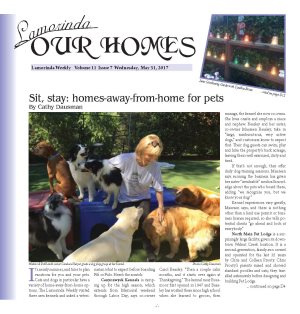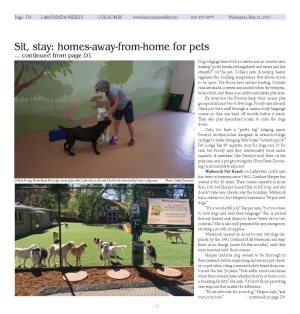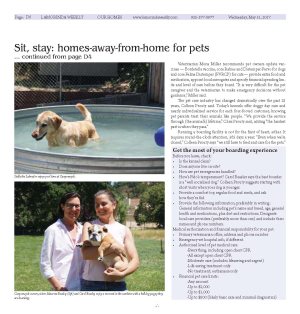| | Published May 31st, 2017
| Sit, stay: homes-away-from-home for pets
| | | By Cathy Dausman | 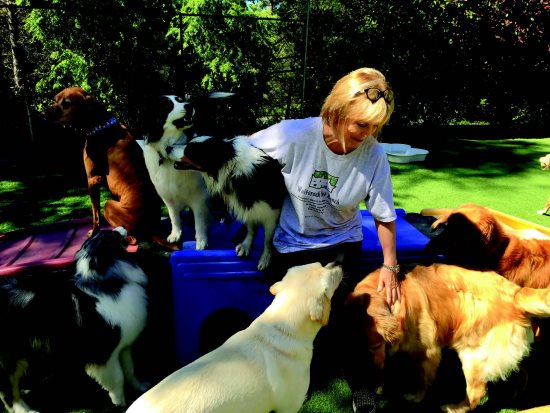 | | Waiterock Pet Ranch owner Candace Harper greets a dog play group at her kennel. Photos Cathy Dausman |
It's nearly summer, and time to plan vacations for you and your pets. Cats and dogs in particular have a variety of home-away-from-home options. The Lamorinda Weekly visited three area kennels and asked a veterinarian what to expect before boarding Fifi or Fido. Here's the scratch:
 Canyonwyck Kennels is ramping up for the high season, which extends from Memorial weekend through Labor Day, says co-owner Carol Beasley. "Then a couple calm months, and it starts over again at Thanksgiving." The kennel near Rossmoor first opened in 1947 and Beasley has worked there since high school when she learned to groom, then manage, the kennel she now co-owns. She lives onsite and employs a niece and nephew. Beasley and her sister, co-owner Maureen Beasley, take in "large, rambunctious, very active dogs," and customers know to expect that. Their dog guests can swim, play and hike the property's back acreage, leaving them well exercised, dirty and tired.
Canyonwyck Kennels is ramping up for the high season, which extends from Memorial weekend through Labor Day, says co-owner Carol Beasley. "Then a couple calm months, and it starts over again at Thanksgiving." The kennel near Rossmoor first opened in 1947 and Beasley has worked there since high school when she learned to groom, then manage, the kennel she now co-owns. She lives onsite and employs a niece and nephew. Beasley and her sister, co-owner Maureen Beasley, take in "large, rambunctious, very active dogs," and customers know to expect that. Their dog guests can swim, play and hike the property's back acreage, leaving them well exercised, dirty and tired.
 If that's not enough, they offer daily dog-training sessions. Maureen says running the business has given her sister "invaluable" medical knowledge about the pets who board there, adding "we recognize you, but we know your dog!"
If that's not enough, they offer daily dog-training sessions. Maureen says running the business has given her sister "invaluable" medical knowledge about the pets who board there, adding "we recognize you, but we know your dog!"
 Kennel experiences vary greatly, Maureen says, and there is nothing other than a land use permit or business license required, so she tells potential clients "go ahead and look at everybody."
Kennel experiences vary greatly, Maureen says, and there is nothing other than a land use permit or business license required, so she tells potential clients "go ahead and look at everybody."
 North Main Pet Lodge is a surprisingly large facility, given its downtown Walnut Creek location. It is a second-generation, family-run owned and operated for the last 25 years by Chris and Colleen Prouty. Chris Prouty's parents raised and showed standard poodles and cats; they travelled extensively before designing and building Pet Lodge. Dog lodgings have both an inside and an outside area, making "potty breaks self-regulated and easier and less stressful" on the pet, Colleen says. A swamp heater regulates the building temperature that allows doors to be open. The floors have radiant heating. Outside runs are shade-covered and misted when the temperatures climb, and there is an additional inside play area.
North Main Pet Lodge is a surprisingly large facility, given its downtown Walnut Creek location. It is a second-generation, family-run owned and operated for the last 25 years by Chris and Colleen Prouty. Chris Prouty's parents raised and showed standard poodles and cats; they travelled extensively before designing and building Pet Lodge. Dog lodgings have both an inside and an outside area, making "potty breaks self-regulated and easier and less stressful" on the pet, Colleen says. A swamp heater regulates the building temperature that allows doors to be open. The floors have radiant heating. Outside runs are shade-covered and misted when the temperatures climb, and there is an additional inside play area.
 By intention the Proutys keep their canine play groups small, just two to five dogs. Prouty says she and Chris put their staff through a canine body language course so they can head off trouble before it starts. They also play specialized music to calm the dogs down.
By intention the Proutys keep their canine play groups small, just two to five dogs. Prouty says she and Chris put their staff through a canine body language course so they can head off trouble before it starts. They also play specialized music to calm the dogs down.
 Cats, too have a "pretty big" lodging space. Prouty's mother-in-law designed its seven-foot-high ceilings to make changing litter boxes "a stand-up job." Pet Lodge has 87 separate runs for dogs and 17 for cats, but Prouty says they intentionally book under capacity. A caretaker (the Prouty's son) lives on the premises, and a pet grooming site (Four Paws Grooming) is immediately adjacent.
Cats, too have a "pretty big" lodging space. Prouty's mother-in-law designed its seven-foot-high ceilings to make changing litter boxes "a stand-up job." Pet Lodge has 87 separate runs for dogs and 17 for cats, but Prouty says they intentionally book under capacity. A caretaker (the Prouty's son) lives on the premises, and a pet grooming site (Four Paws Grooming) is immediately adjacent.
 Waiterock Pet Ranch on Lafayette's north side has been in business since 1942; Candace Harper has owned it for 30 years. Their canine capacity is more than 100, but Harper doesn't like to fill it up, and she doesn't take new clients over the holidays. Waiterock has a cattery too, but Harper's business is "98 per cent dogs."
Waiterock Pet Ranch on Lafayette's north side has been in business since 1942; Candace Harper has owned it for 30 years. Their canine capacity is more than 100, but Harper doesn't like to fill it up, and she doesn't take new clients over the holidays. Waiterock has a cattery too, but Harper's business is "98 per cent dogs."
 "It's a wonderful job," Harper says, "but you have to love dogs and read their language." She is animal first-aid trained and claims to know "every vet in two counties." She is also well prepared for any emergency, stocking a month of supplies.
"It's a wonderful job," Harper says, "but you have to love dogs and read their language." She is animal first-aid trained and claims to know "every vet in two counties." She is also well prepared for any emergency, stocking a month of supplies.
 Waiterock opened its doors to over 300 dogs displaced by the 1991 Oakland Hills Firestorm and kept them at no charge (some for five months) until they were reunited with their owners.
Waiterock opened its doors to over 300 dogs displaced by the 1991 Oakland Hills Firestorm and kept them at no charge (some for five months) until they were reunited with their owners.
 Harper cautions dog owners to be thorough in their research before employing anyone as a pet checker or pet sitter, citing comments she's heard from customers the last 30 years. "Pets suffer emotional stress when their owners leave whether they're at home or in a boarding facility," she says. "It's how those providing care respond that makes the difference.
Harper cautions dog owners to be thorough in their research before employing anyone as a pet checker or pet sitter, citing comments she's heard from customers the last 30 years. "Pets suffer emotional stress when their owners leave whether they're at home or in a boarding facility," she says. "It's how those providing care respond that makes the difference.
 "Be an advocate for your dog," Harper says, "and tour, tour, tour."
"Be an advocate for your dog," Harper says, "and tour, tour, tour."
 Veterinarian Mona Miller recommends pet owners update vaccines - Bordetella vaccine, core Rabies and Distemper-Parvo for dogs and core Feline Distemper (FVRCP) for cats- provide extra food and medication, appoint local surrogates and specify financial spending limits and level of care before they board. "It is very difficult for the pet caregiver and the veterinarian to make emergency decisions without guidance," Miller said.
Veterinarian Mona Miller recommends pet owners update vaccines - Bordetella vaccine, core Rabies and Distemper-Parvo for dogs and core Feline Distemper (FVRCP) for cats- provide extra food and medication, appoint local surrogates and specify financial spending limits and level of care before they board. "It is very difficult for the pet caregiver and the veterinarian to make emergency decisions without guidance," Miller said.
 The pet care industry has changed dramatically over the past 25 years, Colleen Prouty said. Today's kennels offer doggy day care and nearly individualized service for each four-footed customer, knowing pet parents treat their animals like people. "We provide the service through (the animal's) lifetime," Chris Prouty said, adding "the hardest part is when they pass."
The pet care industry has changed dramatically over the past 25 years, Colleen Prouty said. Today's kennels offer doggy day care and nearly individualized service for each four-footed customer, knowing pet parents treat their animals like people. "We provide the service through (the animal's) lifetime," Chris Prouty said, adding "the hardest part is when they pass."
 Running a boarding facility is not for the faint of heart, either. It requires round-the-clock attention, 365 days a year. "Even when we're closed," Colleen Prouty says "we still have to feed and care for the pets."
Running a boarding facility is not for the faint of heart, either. It requires round-the-clock attention, 365 days a year. "Even when we're closed," Colleen Prouty says "we still have to feed and care for the pets."


|
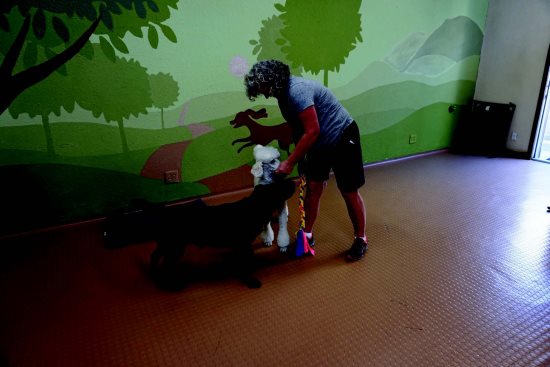 | | Colleen Prouty, North Main Pet Lodge owner, plays with Sophie the poodle and Jolie the lab at her facility's indoor play area. Photos Cathy Dausman | 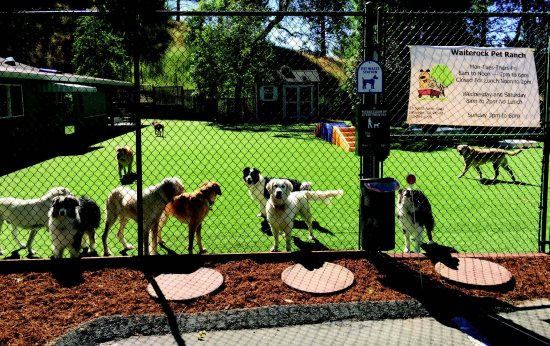 | | | 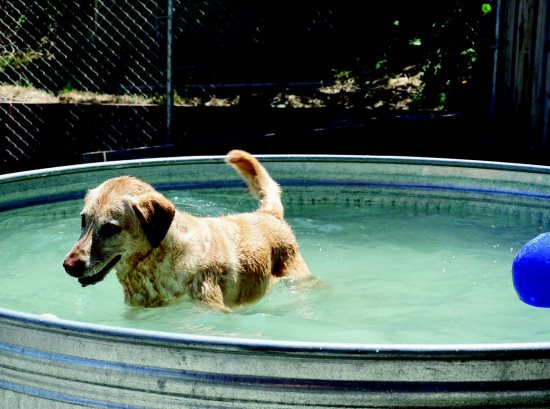 | | Stella the Labrador enjoys pool time at Canyonwyck. | 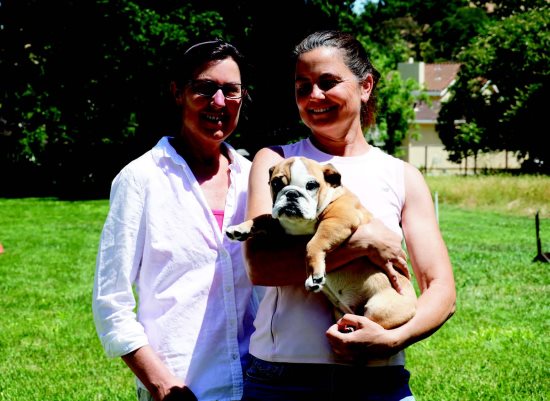 | | Canyonwyck owners, sisters Maureen Beasley (left) and Carol Beasley enjoy a moment in the sunshine with a bulldog puppy they are boarding. |  Get the most of your boarding experience
Get the most of your boarding experience
 Before you leave, check:
Before you leave, check:
 � Is the kennel clean?
� Is the kennel clean?
 � Does anyone live on-site?
� Does anyone live on-site?
 � How are pet emergencies handled?
� How are pet emergencies handled?
 � How's Fido's temperament? Carol Beasley says the best boarder is a "well socialized dog." Colleen Prouty suggests starting with short visits when your dog is younger.
� How's Fido's temperament? Carol Beasley says the best boarder is a "well socialized dog." Colleen Prouty suggests starting with short visits when your dog is younger.
 � Provide a comfort toy, regular food and meds, and ask
� Provide a comfort toy, regular food and meds, and ask
 how they're fed.
how they're fed.
 � Provide the following information, preferably in writing:
� Provide the following information, preferably in writing:
 General information including pet's name and breed, age, general health and medications, plus diet and restrictions. Designate local care providers (preferably more than one) and include their names and phone numbers.
General information including pet's name and breed, age, general health and medications, plus diet and restrictions. Designate local care providers (preferably more than one) and include their names and phone numbers.
 Medical authorization and financial responsibility for your pet:
Medical authorization and financial responsibility for your pet:
 � Primary veterinarian office, address and phone number
� Primary veterinarian office, address and phone number
 � Emergency vet hospital info, if different.
� Emergency vet hospital info, if different.
 � Authorized level of pet medical care:
� Authorized level of pet medical care:
 -Everything, including open chest CPR
-Everything, including open chest CPR
 -All except open chest CPR
-All except open chest CPR
 -Moderate care (includes lifesaving and urgent)
-Moderate care (includes lifesaving and urgent)
 -Life saving treatment only
-Life saving treatment only
 -No treatment; euthanasia only
-No treatment; euthanasia only
 � Financial pet care limits:
� Financial pet care limits:
 -Any amount
-Any amount
 -Up to $2,000
-Up to $2,000
 -Up to $1,000
-Up to $1,000
 -Up to $500 (likely basic care and minimal diagnostics)
-Up to $500 (likely basic care and minimal diagnostics) | | | | | |







